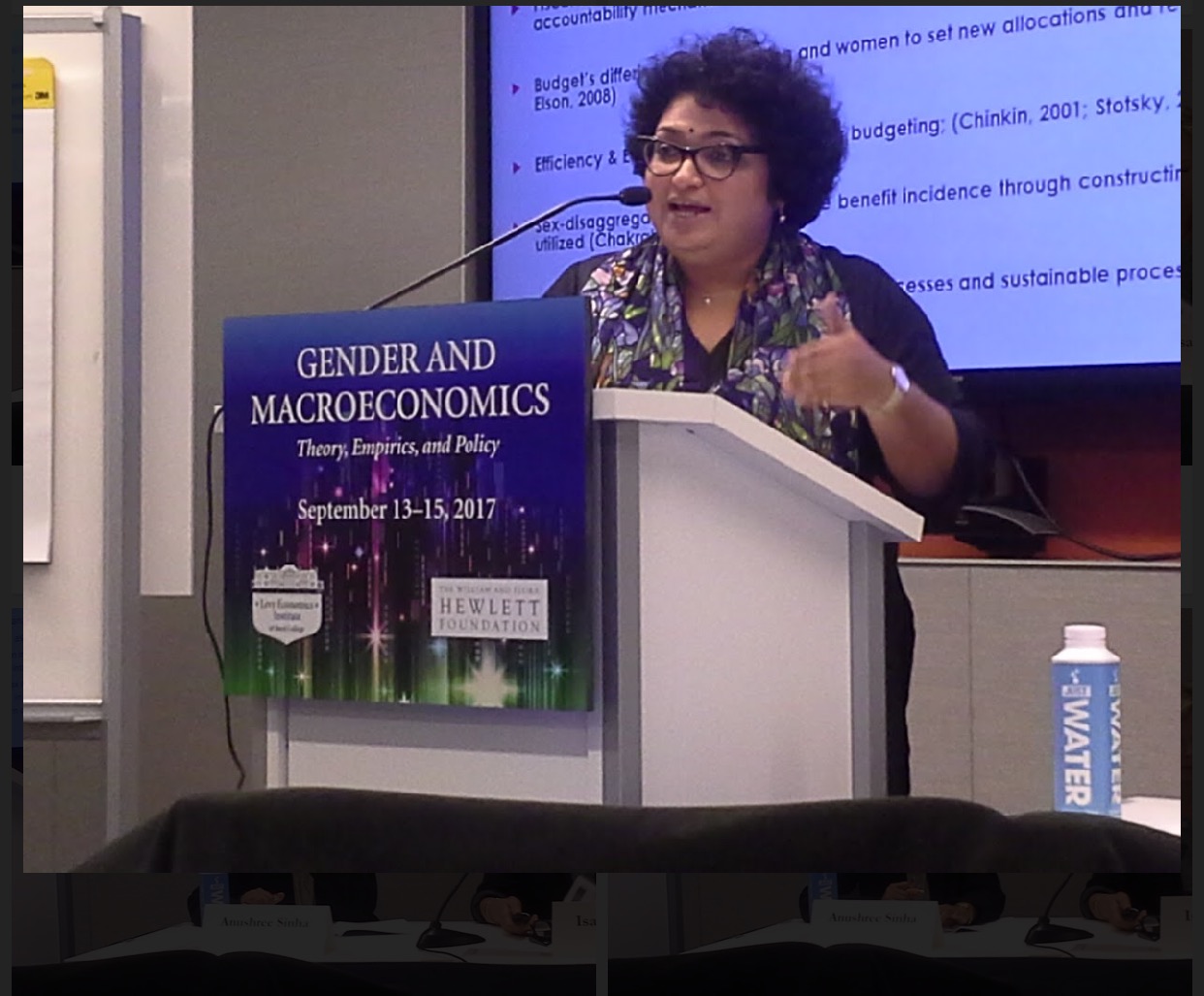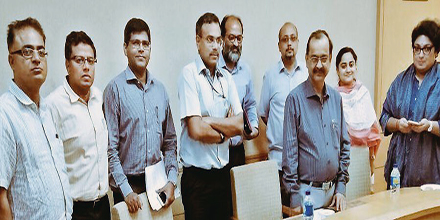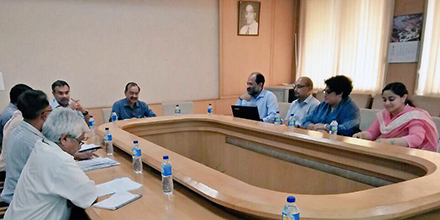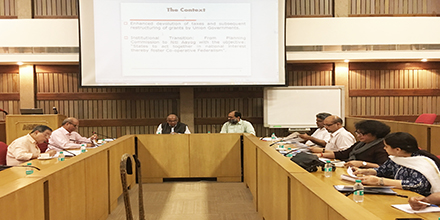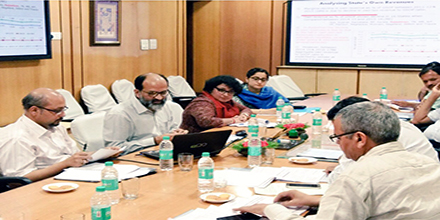Projects
Past projects
Data Sharing Agreement between Dvara Research Foundation and NIPFP
- Completion date दिसम्बर, 2018
- Sponsor Dvara Research Foundation
- Project leader Renuka Sane
India-LINK Model
- Completion date दिसम्बर, 2018
- Sponsor Multiple Agencies
- Project leader N.R. Bhanumurthy
-
Focus
This is an on-going collaboration with Delhi School of Economics, under which annual macroeconomic forecasts are provided to the UN-DESA, New York.
Comprehensive Study of Assam State Finances to Recommend 10 years Perspective Planning and Concomitant Changes in the Public Finance Management
- Completion date दिसम्बर, 2018
- Sponsor Government of Assam
- Project leader Rathin Roy
- Other faculty Kavita Rao, Pinaki Chakraborty, N.R. Bhanumurthy, Pratap Ranjan Jena, Sacchidananda Mukherjee, H.K. Amarnath, Manish Gupta
-
Focus
1. Study the trend of revenue of generation and suggest measure to augment the resources in the light of new policy of Central Government after advent of NITI Aayog and post 14th FC award; 2. Study and recommend to the State government on how to reduce wasteful expenditure and plug loopholes and leakages, how to raise revenues etc.; 3. Study the pattern of expenditure and suggest measures for Public expenditure reforms.; 4. Study the current status of various decentralisation initiatives (including transfers made to Rural, urban local bodies, VIIth Schedule areas, development and autonomous councils); 5. Study the impact of state-level public sector enterprises on their finances and, measures taken for improving their performance; 6. Study the impact of power sector reforms on state finances and suggest measures for sustained development.; 7. Analysis of contingent liabilities; 8. Evaluation and targeting of subsidies by the states; 9. Submit the 10 year perspective plan from 2016 to 2026 along with the structural and institutional reforms in public finance in the State.
- See details
Can Monetary Policy pursue Financial Stability in India
- Start date मई, 2017
- Completion date दिसम्बर, 2018
- Sponsor Indian Council of Social Science Research (ICSSR)
- Project leader Ila Patnaik
- Consultants/Other authors Radhika Pandey, Shalini Mittal
-
Focus
To investigate the trade-off between price stability and financial stability in India.
Outcome Evaluation of State Finances in the context of recommendations of the 14th Finance Commission: Determination of a sustainable debt roadmap for 2020-25, taking into account impact of introduction of GST and other tax/non-tax trend forecasts
- Completion date दिसम्बर, 2018
- Sponsor Government of J&K
- Project leader Pinaki Chakraborty
Sikkim State Finances: Implications of the award of the Fourteenth Finance Commission
- Start date मार्च, 2016
- Completion date दिसम्बर, 2018
- Sponsor Government of Sikkim
- Project leader Pinaki Chakraborty
Determining Private Corporate Investment in India: Role of Monetary and Fiscal Policy Stance
- Start date नवम्बर., 2017
- Completion date नवम्बर., 2018
- Sponsor Fordham University, New York
- Project leader Lekha Chakraborty
- Other faculty Hrishikesh Vinod (Fordham University)
- Consultants/Other authors Honey Karun (IMF)
-
Focus
To analyze the determinants of corporate investment in India, at the aggregate level, incorporating monetary and fiscal policy variables, in India, using maximum entropy ensembles and bootstrapping methodology.
Level and Composition of Subsidies in India: 1987-88 to 2015-16
- Start date जनवरी., 2015
- Completion date सितम्बर., 2018
- Sponsor NIPFP Sponsored Study
- Project leader Sudipto Mundle
- Consultants/Other authors Satadru Sikdar
-
Focus
The present study is re-estimating the level and compositions of subsidies in India for the base year 1987-88 and 2011-12, updating upto 2015-16.
Analysis of Public Expenditure Pattern in India
- Start date अग., 2015
- Completion date सितम्बर., 2018
- Sponsor Partly funded by financial support from Centre for Public Affairs and Critical Theory, Shiv Nadar University
- Project leader Sudipto Mundle
- Consultants/Other authors Satadru Sikdar
-
Focus
The purpose of the study is to analyse how the pattern of public expenditure has evolved over time with specific reference to allocation of government expenditure on public goods, merit goods and private goods.
2017-18 Evaluation of Governance Parameters of Pradhan Mantri Awaas Yojana-Gramin (PMAY-G)
- Start date दिसम्बर, 2017
- Completion date सितम्बर., 2018
- Sponsor Ministry of Rural Development, Government of India
- Project leader N. R. Bhanumurthy and H.K. Amarnath
- Other faculty Bhabesh Hazarika
- Consultants/Other authors Krishna Sharma, Tanvi Bramhe and Kanika Gupta
Evaluation of Governance Parameters of Pradhan Mantri Awaas Yojana-Gramin (PMAY-G)
- Start date दिसम्बर, 2017
- Completion date सितम्बर., 2018
- Sponsor Ministy of Rural Development,GOI
- Project leader N.R. Bhanumurthy and H. K. Amarnath
- Other faculty Bhabesh Hazarika
- Consultants/Other authors Krishna Sharma Tanvi Bramhe Kanika Gupta
BIOFIN: Mobilising Resources for Biodiversity conservation
- Start date दिसम्बर, 2017
- Completion date सितम्बर., 2018
- Sponsor UNDP
- Project leader Rathin Roy
- Other faculty Rita Pandey, Renuka Sane and Priya Yadav
BIOFIN: Mobilising Resources for Biodiversity conservation
- Start date दिसम्बर, 2017
- Completion date सितम्बर., 2018
- Sponsor UNDP
- Project leader Rita Pandey, Renuka Shane
- Consultants/Other authors Priya Yadav, Sumit Aggarwal
MCA Expert Committee on Auditors - MOU between Ministry of Corporate Affairs and NIPFP
- Start date मई, 2018
- Completion date अग., 2018
- Sponsor Ministry of Corporate Affairs (MCA)
- Project leader Ajay Shah
- Consultants/Other authors Shubho Roy, Ashish Aggarwal, Shefali Malhotra, Sudipto Banerjee
-
Focus
The Supreme Court has asked the government to form a three member committee to look at the operations of Multinational Audit Firms (MAFs). NIPFP is the secretariat to the committee.
MCA Expert Committee on Auditors MOU between Ministry of Corporate Affairs and NIPFP
- Start date मई, 2018
- Completion date अग., 2018
- Sponsor Ministry of Corporate Affairs (MCA)
- Project leader Ajay Shah
- Consultants/Other authors Ashish Aggarwal, Shefali Malhotra, Shubho Roy, Sudipto Banerjee
-
Focus
The Supreme Court has asked the government to form a three member committee to look at the operations of Multinational Audit Firms (MAFs). NIPFP is the secretariat to the committee
Biodiversity - Finance and Access and Benefit Sharing in India: Assessment of key Challenges leading to Revenue Loss
- Start date मई, 2018
- Completion date जुलाई, 2018
- Sponsor UNDP
- Project leader Rathin Roy
- Other faculty Rita Padey
-
Focus
This study will feed into NIPFP’s ongoing project on Biodiversity finance.
Automatic Leading Indicator Approach to Forecasting GDP and Inflation
- Start date मई, 2017
- Completion date मई, 2018
- Sponsor MoF
- Project leader Sudipto Mundle
- Other faculty N.R. Bhanumurthy
- Consultants/Other authors Rudrani Bhattacharya and Parma Devi Adhikari
-
Focus
Objective is to forecast GDP and inflation
Study "Can Monetary Policy pursue Financial Stability in India"
- Start date मई, 2017
- Completion date अप्रैल, 2018
- Sponsor Indian Council of Social Science Research (ICSSR)
- Project leader Ila Patnaik
- Other faculty Radhika Pandey and Shalini Mittal
-
Focus
To investigate the trade-off between price stability and financial stability in India
The Review of Compliance of the Government of Sikkim to the State FRBM Act for the Year 2016–17
- Completion date मार्च, 2018
- Sponsor Government of Sikkim
- Project leader Pratap Ranjan Jena
-
Focus
The report assessed the fiscal stance of the state government while implementing the provisions of FRBM Act for the year 2016–17 as per the amendments to the Act in accordance with the recommendations of the 14th Finance Commission.
4th NIPFP-DEA Research Programme
- Start date अप्रैल, 2014
- Completion date मार्च, 2018
- Sponsor Ministry of Finance
- Project leader Ajay Shah
- Other faculty Ila Patnaik
- Consultants/Other authors Anirudh Burman, Ashim Kapoor, Ashish Aggarwal, Manya Nayar, Mayank Mahawar, Neena Jacob, Nelson Chaudhuri, Pramod Sinha, Jai Vipra, Mahima Gupta Bhavyaa Sharma, Rachna Sharma, Radhika Pandey, Sanhita Sapatnekar, Shalini Mittal, Manpreet Singh, Smriti Sharma, Sumant Prashant, Suyash Rai
-
Focus
(1st April 2014-31st March 2017)
This is the fourth MOU signed on 3 April 2014 between the NIPFP and the Department of Economic Affairs (DEA), Ministry of Finance, Government of India to undertake the NIPFP-DEA Research Program. The research program aims to provide research input to approach several new challenges that face DEA and the Ministry of Finance. The research program will address larger questions of fiscal, financial and monetary policy in an open-economy setting, but also provide what is perceived as the indispensable - a research oriented policy support framework for topical issues that are of concern to the Ministry. Within the overall framework of the objectives, NIPFP will also undertake activities relating to implementation of FSLRC recommendations.
Macroeconomic Policy Management for SDGs: Identifying Monetary and Fiscal Policy Tools
- Start date अग., 2017
- Completion date फ़रवरी., 2018
- Sponsor Macroeconomic Policy Division, UNESCAP
- Project leader Lekha Chakraborty
-
Focus
The study analyses the macroeconomic policy regimes in Asia-Pacific Region and identifies the specific policy tools for Integrating SDGs.
Policy input regarding Digital Object Architecture (DOA)
- Start date अग., 2017
- Completion date जनवरी., 2018
- Sponsor Department of Telecommunications (DoT)
- Project leader Ajay Shah
- Consultants/Other authors Smriti Parsheera, Vishal Trehan, Sudipto Banerjee
-
Focus
Study models of implementation of MPA structure in different countries.
A study of Intergovernmental Fiscal Transfers in India
- Start date जुलाई, 2016
- Completion date जनवरी., 2018
- Sponsor IDRC, Canada
- Project leader Pinaki Chakraborty
- Other faculty Lekha Chakraborty, Manish Gupta, Amandeep Kaur, Shatakshi Garg, Azharuddin Khan
-
Focus
The objective of the proposed study is to examine the systems, institutions, architecture of federalism and decentralisation in the country and how they have evolved over time and how the transfer system has addressed the issue of regional inequality, human development and basic social service delivery differentials in India. The study would contribute to NIPFP’s institutional objectives of assisting the Central, State and Local governments in formulating and reforming public policies by providing an analytical base and would be a rich source of learning for other countries in the region.
The study is part of an 18-month research project undertaken jointly with the Social Policy and Development Centre (SPDC).
-
See details
Related events:
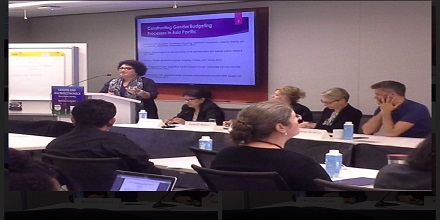
The paper prepared as part of IDRC Federalism project, titled 'Efficacy of Gender Budgeting on Gender Equality Outcome and Fiscal Space: Empirical Evidences from Asia Pacific", was presented by Lekha Chakraborty (pic above) in the Gender and Macroeconomics Conference organised by the Levy Economics Institute at Park Avenue 101, New York City , September 13-15, 2017. Janet Stotsky of IMF discussed the paper in the meeting following the presentation. This paper is prepared by Lekha Chakraborty in collaboration with Marian Ingrams of Harvard Law School who is currently a Fulbright affiliate of NIPFP and Yadawendra Singh, former IDRC Project Associate at NIPFP.
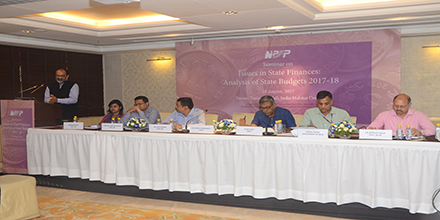
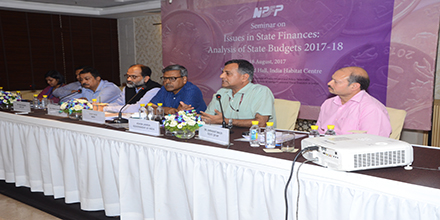
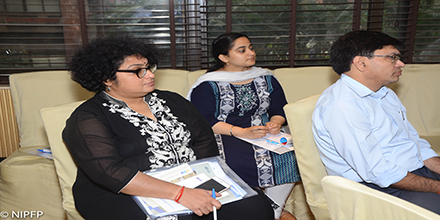 NIPFP Seminar on "Issues in StateFinances – Analysis of State Budgets 2017-18", 18th August, 2017, 3pm, IHC.- Schedule
NIPFP Seminar on "Issues in StateFinances – Analysis of State Budgets 2017-18", 18th August, 2017, 3pm, IHC.- Schedule
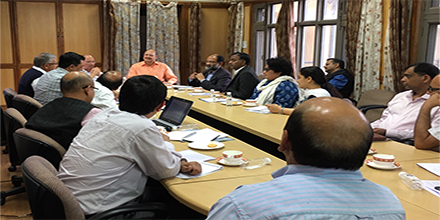
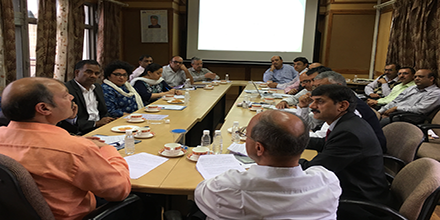
NIPFP High-level Meetings on Himachal Pradesh State Finances Post-Fourteenth Finance Commission with Additional Chief Secretary(s) - Finance & Planning & other top officers at Himachal Pradesh Secretariat at Shimla, held on June 27, 2017 (pics above).
NIPFP high level Meeting with Addl. Chief Secretary and top officials of Dept of Finance, at State Secretariat Vallabh Bhavan, Bhopal, May 18th 2017. The Second high level Meeting was with Planning Board officials and the top officials of sectoral Ministries in Vindhyachal Bhawan, Bhopal (pics above).
Former Governor, Reserve Bank of India and Chairman, 14th Finance Commission, Dr. Y.V. Reddy chairs IDRC-NIPFP Technical Advisory meeting on State Finance, May 12, 2017, NIPFP (pic above).
NIPFP's High level Meeting with State Officials was convened by the Chief Secretary, Govt. of Rajasthan regarding emerging issues in public finance including UDAY debt, at the Secretariat, Jaipur, Govt of Rajasthan, on April 19, 2017 (pic above).
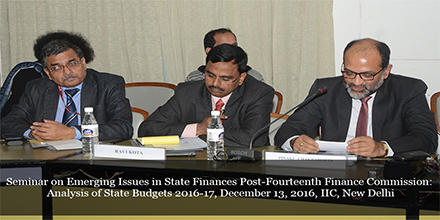
Seminar on "Emerging Issues in State Finances Post-Fourteenth Finance Commission: Analysis of State budgets 2016-17", held on 13 December, 2016 at IIC, New Delhi (details on events page and pic above).
Related papers:
I. Policy note:Analysis of State budgets 2016-17. PDFPolicy note. PDFII. Journal Publications:State level debt-deficit dynamics. PDFEmerging Issues in Union-State Fiscal Relations. PDFIII. Federalism BlogIV. Opinion columns:-
Is fiscal prudence really fading away? PDF
-
Policy input regarding Digital Object Architecture (DOA)
- Start date अग., 2017
- Completion date जनवरी., 2018
- Sponsor Department of Telecommunications (DoT)
- Project leader Ajay Shah
- Consultants/Other authors Smriti Parsheera, Vishal Trehan, Sudipto Banerjee
-
Focus
Study models of implementation of MPA structure in different countries.
Reform of the Government School system: Towards greater trust
- Start date जून, 2016
- Completion date जनवरी., 2018
- Sponsor Azim Premji University
- Project leader Sukanya Bose
- Consultants/Other authors Priyanta Ghosh (Research Scholar, JNU) and Arvind Sardana (Eklavya)
-
Focus
Abstract: Bringing about equity and quality in education faces serious challenges. The enhanced demand for education especially among the most marginalised sections of the society has gone hand in hand with increasing stratification of education. The “crowding out” of public schools by private schools has led to opportunities for schooling being distributed in an unequal manner depending on income. On the other hand, the low standards of public education with the weak functionality of the government schools offers little alternative to the private sector schools, even if the latter is of largely ramshackle quality. Unless there are reforms in government schooling system, strong market advocates of low cost private schools will make deeper inroads.One of the main hurdles to proper reform of public schooling is the financial constraint. More and more people in policy circles seem to fall for the argument that proper government schools are simply not affordable from the point of view of the State, hence there is little sense in speaking of equity. Some authors demonstrate that even an allocation of 6% of GDP to the education budget would not be sufficient to fund universal school education if the reliance is to be wholly or even primarily on government school system. This study will attempt to examine the assumptions underlying the resource constraint model.
- See details
Review of Compliance to Odisha FRBM Act for the Fiscal Year 2015-16
- Completion date दिसम्बर, 2017
- Sponsor Government of Odisha
- Project leader Pratap Ranjan Jena
-
Focus
The review report contains detailed evaluation of the State finances as projected in the budget for the year 2015-16 and the budget out-turns as reported in the Finance Accounts for the year and the fiscal management principles enunciated in the FRBM Act. The review report assessed the achievements of the State Government while implementing the provisions of FRBM Act.
The Review of Compliance of the provisions made in Odisha FRBM Act for the year 2015-16
- Completion date दिसम्बर, 2017
- Sponsor Government of Odisha
- Project leader Pratap Ranjan Jena
The Review of Compliance of the Government of Sikkim to the FRBM Act 2015-16
- Completion date दिसम्बर, 2017
- Sponsor Government of Sikkim
- Project leader Pratap Ranjan Jena
Bi-annual Review of the Compliance of the provisions of the Madhya Pradesh FRBM Act 2015-16
- Completion date दिसम्बर, 2017
- Sponsor Government of Madhya Pradesh
- Project leader Pratap Ranjan Jena
Institutional Assessment and Gap Analysis of Tribal Research and Development Institute (TRDI), Bhopal
- Start date सितम्बर., 2017
- Completion date दिसम्बर, 2017
- Sponsor Tribal Research and Development Institute (TRDI), Bhopal, Government of Madhya Pradesh
- Project leader Pinaki Chakraborty
- Other faculty Rudrani Bhattacharya, Shruti Tripathi
-
Focus
Tribal Research and Development Institute, Madhya Pradesh in partnership with UNICEF, Bhopal conducted this study to enhance the capacity of the tribal research institute conduct research and evaluation, and generate evidences for policy recommendations, especially for the tribal.
Study on Assessment of Credit stress in the Indian Corporate Sector
- Start date जुलाई, 2017
- Completion date दिसम्बर, 2017
- Sponsor Ministry of Corporate Affairs (MCA)
- Project leader Ajay Shah
- Other faculty Radhika Pandey and Pramod Sinha
-
Focus
To fill the prevalent corporate stress gap through (i) Assessing the vulnerability of the Indian corporate sector using firm level dataset (ii) Analysing corporate stress across different sectors and sub-sectors using a number of indicators, and constructing a sector-wise vulnerability index (iii) Quantifying credit stress using the Distance-to-Default methodology
Study on “Assessment of credit stress in the Indian Corporate Sector”
- Start date जुलाई, 2017
- Completion date दिसम्बर, 2017
- Sponsor Ministry of Corporate Affairs (MCA)
- Project leader Ajay Shah
- Consultants/Other authors Radhika Pandey and Pramod Sinha
-
Focus
To fill the prevalent corporate stress gap through (i) Assessing the vulnerability of the Indian corporate sector using firm level dataset (ii) Analysing corporate stress across different sectors and sub-sectors using a number of indicators, and constructing a sector-wise vulnerability index (iii) Quantifying credit stress using the Distance-to-Default methodology.
Policy research on strategic disinvestment of Central Public Sector Enterprises (CPSEs) and policy analysis on loss making CPSEs (3rd and 4th report)
- Start date सितम्बर., 2017
- Completion date नवम्बर., 2017
- Sponsor National Institution for Transforming India (NITI) Aayog
- Project leader Ajay Shah
- Consultants/Other authors Suyash Rai
-
Focus
Advise on Strategic Disinvestment from Central Public Sector Enterprises (CPSEs) and provide policy analysis on loss making CPSEs.
Research and advisory services for Restructuring and Strengthening of National Council for Vocational Training (NCVT)
- Start date जून, 2017
- Completion date अक्टूबर, 2017
- Sponsor Ministry of Skill Development & Entrepreneurship (MSDE)
- Project leader Ajay Shah
- Consultants/Other authors Anirudh Burman, Suyash Rai and Aditya Singh Rajput
-
Focus
To help the ministry make decisions about restructuring NCVT as a regulator. This includes decisions and functions of NCVT as well as the governance and processes at NCVT.
Biodiversity Finance Initiative under Natural Resource Management Project
- Start date अक्टूबर, 2015
- Completion date अक्टूबर, 2017
- Sponsor UNDP
- Project leader Rathin Roy
- Other faculty Rita Pandey, Manish Gupta
-
Focus
BIOFIN aims to develop a methodology for quantifying the biodiversity finance gap at national level, for improving cost-effectiveness through mainstreaming of biodiversity into national development and sectoral planning, and for developing comprehensive national resource mobilization strategies. BIOFIN will feed into the development of NBSAPs, while the NBSAP projects in turn will provide a platform for integration into decision-making processes.
Central Transfers to States in India: Rewarding Performance While Ensuring
- Start date मई, 2017
- Completion date अग., 2017
- Sponsor NITI Aayog, Government of India
- Project leader M. Govinda Rao
-
Focus
This study attempts to review the prevailing system of transfers and attempts to identify reform areas.
Impact evaluation study of the Digital-India Land Records Modernisation Programme
- Start date दिसम्बर, 2016
- Completion date जुलाई, 2017
- Sponsor National Council of Applied Economic Research (NCAER)
- Project leader Ajay Shah
- Consultants/Other authors Anirudh Burman, Suyash Rai, Devendra Damle, Itishree Rana
-
Focus
To evaluate the performance of various activities taken up under the erstwhile NLRMP and present DILRMP, identify constraints in the implementation of these programmes, identify good practices and the gaps in achievement of NLRMP objectives and suggest appropriate changes to improve the effectiveness of DILRMP.
The implementation of WDRA Transformation Programme
- Start date जनवरी., 2016
- Completion date जून, 2017
- Sponsor The Warehousing Development and Regulatory Authority (WDRA)
- Project leader Ajay Shah
- Other faculty M/F Team
-
Focus
To provide policy and analytical support to the WDRA for the implementation of WDRA Transformation plan its various components.
Study on "Assessment of credit stress in the Indian Corporate Sector"
- Start date जुलाई, 2017
- Completion date जून, 2017
- Sponsor Ministry of Corporate Affairs (MCA)
- Project leader Ajay Shah, Radhika Pandey, Pramod Sinha, Amey Sapre
-
Focus
To fill the prevalent corporate stress gap through (i) Assessing the vulnerability of the Indian corporate sector using firm level dataset (ii) Analysing corporate stress across different sectors and sub-sectors using a number of indicators, and constructing a sector-wise vulnerability index (iii) Quantifying credit stress using the Distance-to-Default methodology.
Understanding High Unspent Balances and Fund Flow Mechanism in Major Rural Development Programmes
- Start date जनवरी., 2014
- Completion date मई, 2017
- Sponsor Ministry of Rural Development, Government of India
- Project leader N. R. Bhanumurthy
- Other faculty H. K. Amar Nath
-
Focus
Under this project, the team has completed first part on MGNREGS and has already been published as a book by NIPFP titled “Unspent Balances and Fund Flow Mechanism under Mahatma Gandhi National Rural Employment Guarantee Scheme (MGNREGS)”. Under this project, second report on PMGSY, IAY, NRLM and NSAP programmes are under progress.
Bottlenecks and Opportunities in Public Financial Management and Fund Flows for Health Sector in India
- Start date जुलाई, 2016
- Completion date मई, 2017
- Sponsor World Heath Organization (WHO)
- Project leader Mita Choudhury
- Other faculty Ranjan Kumar Mohanty
- Consultants/Other authors Jay Dev Dubey, Diwan Chand
-
Focus
The study will document the bottlenecks in fund flows in the health sector from Union to State Governments, from State Governments to State-level implementating agencies and from State to district-level implementing agencies in 3 selected States. In particular, the study will focus on the processes and timeliness of releases of funds in selected States. The insights will be used to suggest reforms in the architecture of Public Financial Management in these States.

